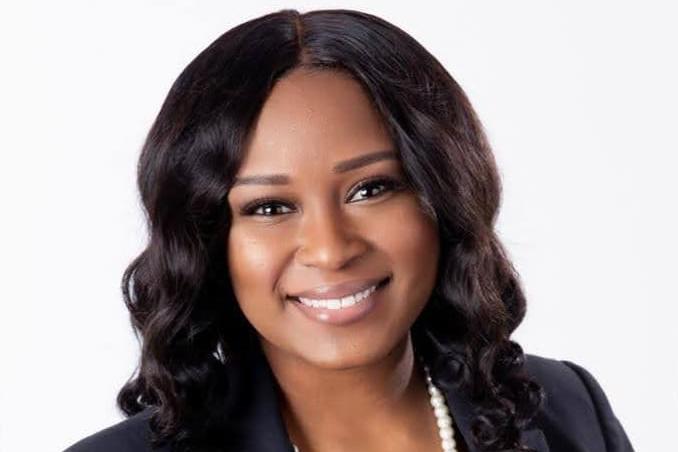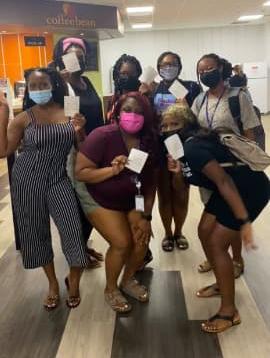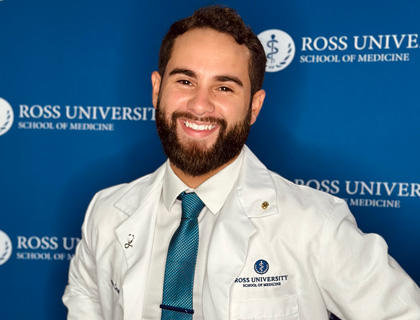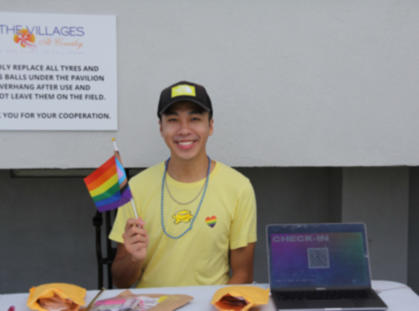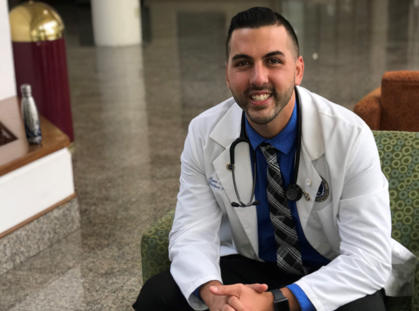Third-semester student Tahara Jordan, Class of ’25, is deep into her studies at Ross University School of Medicine (RUSM) and aiming for a future career as an OB/GYN. Despite her busy medical school schedule, she’s made time to manage a campus organization—Black Female Doctors.
Growing up in a single-parent home in inner-city Hartford, Connecticut, she did well academically, received scholarships, and was fortunate to be selected to attend a prestigious boarding school. “I witnessed a lot of things growing up; from teen pregnancy to high crime rates which were crippling our community generation after generation. I had childhood friends who were dead by seventh or eighth grade. I even saw the lack of equity in education and healthcare when compared to suburban parts of the state. These various experiences led me to choose medicine for my life’s goal.”
Searching for Black women doctors
A first-generation college student, Jordan graduated with a bachelor’s degree in biology and chemistry and a master’s degree in physiology from Florida A&M University in Tallahassee. She focused on attending medical school, however, in researching medical careers and looking for mentors, she noticed a gap in representation for Black women doctors and Black professional women in general. “There seemed to be fewer Black women in medicine. I wanted to be part of changing that, not only for myself but for other Black women who want to enter the medical field.”
The number of Black female doctors in the U.S. and women doctors as a whole represents a far-reaching and long-established issue in medicine. According to a 2021 article in The Lancet, while the U.S. is 13 percent Black, only 5.4 percent of physicians are Black—and of those, only 2.8 percent are Black women.
In 2018, while attempting to get into medical school, Jordan met a Black female RUSM graduate who instantly became her mentor. “She helped me realize there are Black women who have earned their MD degrees, who are finding opportunities and working in medicine. She told me about RUSM and guided me through the entire application and interview process—and here I am in my second year already.”
The birth of the campus organization
Excited to begin at Ross Med, she participated in the Medical Education Readiness Program (MERP) and started her first semester in January 2021. It was on a visit to the virtual RUSM Club Fair that the idea of Black Female Doctors was born. “I noticed there was no organization representing Black female medical students [at the school], and I knew it was up to me to start one.”
She joined RUSM Black Male Doctors to see how clubs operated on campus, then, along with her roommate, Faith Emovon David (now vice president of the organization), created the mission statement in August 2021 for the women’s organization. It includes the desire for a space for Black women to grow in sisterhood and promotes academic and professional self-discovery.
The purpose is to establish connections and collaborate with other Black students, educate the RUSM community, and spread awareness of the impact of Black women in medicine. “I wanted it to be a resource for networking, mentoring, education, events, and service. Most of all, I wanted to encourage, guide, and support Black women who are pursuing careers in medicine. Our motto is, ‘Lifting as we climb.’ We’ll lift each other to be well-represented and boost the number of Black female physicians,” says Jordan.
Black female medical students learn to empower each other
Black Female Doctors already has more than 50 members, and an executive board of eight leaders, with medical specialties across the spectrum. In addition, the organization relies on mentoring from RUSM pharmacology professor, Dr. Natalie Mayers-Aymes, who is the faculty advisor for the group.
Some of the activities the group has facilitated are “silent libraries,” which promote group study, a Thanksgiving potluck, a medical Zumba class that helps students learn anatomy, as well as fundraisers for a local homeless shelter, and food and clothing drives for the Jabez House, a local nonprofit organization. “We plan to do more outreach in the community, such as our Readers as Leaders Program in the primary schools on the island, once the situation with COVID-19 improves,” says Jordan. “We also collaborate with the Black Male Doctors group, which promotes and supports our events. We accept any students as members that want to be a part of our cause.”
In the future, Jordan hopes to expand membership and offer peer mentor question and answer sessions (featuring former Black Female Doctors members) for students to compare notes on experiences and resources, work with RUSM alumni, a Valentine’s Day auction to raise money for local charities, and a karaoke event for Cystic Fibrosis. “Black Female Doctors is looking forward to pairing with other RUSM organizations as well as other organizations in Barbados to increase awareness of a variety of health issues while having fun.”
Members can join by messaging @blackfemaledoctorsrusm on Instagram, emailing blackfemaledoctorsrusm@gmail.com, or by contacting Jordan at TaharaJordan@mail.rossmed.edu.
“Ross Med is the right place for this organization because it is a great place for people who don’t have to prove why they deserve to be doctors to be given a chance,” says Jordan. “RUSM gives Black women the opportunity to be doctors so we can enter the medical field and change the equation.”

